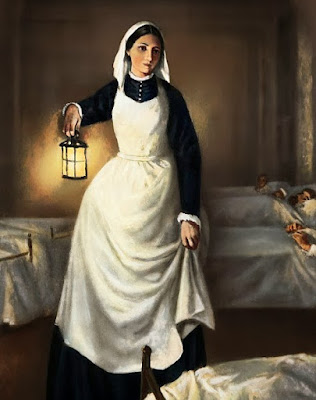Nurses have a long and rich history that dates back to ancient civilizations where women, often mothers and caregivers, were responsible for the basic care of the sick and injured. Modern nursing began in the 19th century, and at the beginning of it all was a 17-year-old girl named Florence Nightingale.
Florence came from a wealthy family and could have settled for the safety and comfort of her time. Instead, she chose a path of service to others – a path that was neither easy nor acceptable for a woman of high society. She rejected the role that had been predetermined for her and followed an inner calling to help. This young woman gradually became a nurse who, through her determination, compassion, and perseverance, managed to save thousands of lives. In the eyes of those to whom she brought light in the silence of the night with her lantern in hospital corridors, she was forever remembered as the Lady with the Lamp – a woman who brought light not only into the darkness of wartime hospitals but also into the entire history of nursing.

zdroj: https://svet-zen.blogspot.com/2020/05/florence-nightingalova.html
Florence Nightingale was born on May 12, 1820, in Florence, Italy, during her parents’ travels across Europe. Her name was symbolically chosen after the city of her birth. She grew up in the environment of British high society, where women were expected to lead social lives rather than pursue professional ambitions. Since girls in the Victorian era were not allowed to study at universities, it was her father who took on the role of teacher, educating her in mathematics, philosophy, and foreign languages.
Seventeen years later, Florence felt a calling from God for the first time, and in that moment, she knew she wanted to dedicate her life to helping others. In 1844, she informed her parents that she wished to spend the following years traveling abroad to gain knowledge and skills in nursing, as no nursing schools existed at that time. Although her family initially disapproved, they eventually decided to support her. Florence visited Egypt, Greece, and Italy, where she met the influential politician Sidney Herbert, who supported her efforts and later helped her implement reforms in nursing.
In 1853, Florence accepted a position as the manager of an institution in London that provided care for ill ladies. Within just one year, she introduced a number of innovations that significantly improved both comfort and the organization of care. Thanks to her measures, patients could now call a nurse directly from their room, meals were delivered straight to the wards via a lift from the kitchen, warm water was introduced, and patients began to be separated based on their diagnosis.
In the same year, British newspapers began reporting on the appalling conditions in hospitals for wounded soldiers during the Crimean War. The conflict, which arose from the clash of Russian and Turkish interests in southeastern Europe, had tragic consequences not only on the battlefield but also in the hospitals, where many soldiers died from infections. Florence was deeply concerned that more soldiers were dying in hospitals than on the front lines. She understood clearly that if sanitary conditions didn’t improve, the death rate would continue to rise.
Florence proposed to the Secretary of War, Sidney Herbert, the creation of a field medical service composed of female nurses. Herbert supported her proposal and subsequently appointed her as the head of this unit.
In 1854, 39 nurses and nuns departed for Turkey, where they were met with incredibly difficult conditions in the local military hospital. The hospital was in chaos—there were no hygiene standards, medications were lacking, and soldiers suffered from malnutrition. Florence immediately introduced mandatory handwashing, established toilets and a laundry, ensured the drainage system was cleaned, and improved ventilation. Thanks to these measures, the mortality rate dropped from 42% to just 2%, and the incidence of diseases such as cholera, dysentery, and typhus significantly decreased. She thus created a functional and efficient hospital.
The nurses cared for the patients in all aspects of their well-being—from hygiene to emotional support and daily needs. Florence’s tireless efforts were captured in a wartime article published in The Times, where the author compared her to an angel who silently walked the hospital corridors. While doctors rested, she walked among the sick with a lamp in hand, personally ensuring that no patient was left without care.
After the war, in 1856, Florence returned home and was celebrated across Britain as a war heroine. She became a symbol of courage and dedication—“the Lady with the Lamp” who saved the lives of hundreds of wounded soldiers.
Source: https://svet-zen.blogspot.com/2020/05/florence-nightingalova.html
After her return, Florence never stopped thinking about how to improve the healthcare system. One of her first ideas was to establish a school for training nurses. Thanks to a wave of public support and financial donations, she was able to invest in the founding of the first nursing school, which opened in July 1860 at St. Thomas’ Hospital in London. As a result, England gained its first professionally trained nurses within five years. Many nurses from abroad came to Florence to learn from her and spread her methods further.
She also wrote books and notes on nursing, which became required reading for all nurses. Her progressive ideas often met resistance from rigid bureaucrats, but thanks to the mathematical and logical skills her father had instilled in her, she was able to be highly persuasive. She frequently used practical examples and graphs to support her arguments.
In the 1870s, Florence began to suffer from health problems and spent most of her time writing. She produced works such as Notes on Lying-In Hospitals and Life and Death in India. In her 80s, she lost her sight, which prevented her from continuing her work. In 1910, at the age of 90, she passed away peacefully.
Her determination brought her numerous honors during her lifetime, including the Order of Merit of the British Empire, which she received as the first woman ever. Today, she is regarded as the founder of modern nursing, and many hospitals around the world bear her name. Thanks to her, thousands of lives were saved that would have otherwise been lost.
Nurses, inspired by the legacy of Florence Nightingale, still face challenges every day that require not only professional knowledge but also immense patience, compassion, and determination. Their mission is clear – to care for the sick, relieve pain, and provide support in difficult times. Often, it is they who stand on the front line of patient care and whose work influences the lives of many. It is important to recognize the vital role they play in our lives – not only in times of crisis, but also in the everyday care that forms the foundation of a quality healthcare system. We should value their tireless work, give them more opportunities for professional growth, and the recognition they truly deserve.









